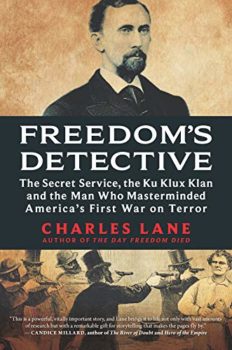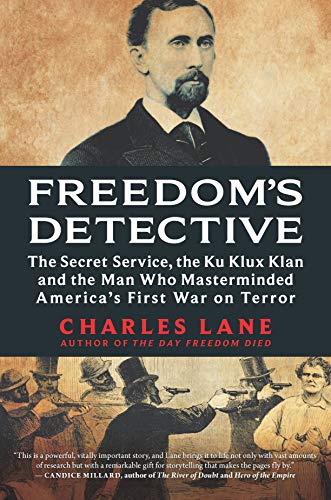
Today’s Ku Klux Klan is not what is used to be. In its first incarnation following the Civil War (1865-1871), the Klan was a terrorist organization of a sort all too familiar to us in the 21st century. The Klan attracted tens of thousands of men, primarily in the Deep South, who lamented the passing of slavery. They were, in effect, the military arm of the Democratic Party, which was then pro-slavery. A great many were former Confederate soldiers.
Estimated reading time: 5 minutes
For a time, the Klan ran rampant, terrorizing, brutally beating, and sometimes lynching Republican officeholders and sympathizers in the South. They also turned violent against newly freed African Americans who dared to vote, but their primary focus was political. They simply rejected Reconstruction and set out to kill everyone in the South who worked to make it a reality.
Freedom’s Detective: The Secret Service, the Ku Klux Klan and the Man Who Masterminded America’s First War on Terror by Charles Lane (2019) 352 pages ★★★★☆
America’s first war on terror?
In Freedom’s Detective, journalist Charles Lane describes the Federal government’s response to Klan violence once Ulysses S. Grant succeeded Andrew Johnson in the White House. Johnson, a virulently racist Democrat, had frustrated Congressional policies to bolster Reconstruction. But Grant’s victory in 1868 brought Radical Republicans into office. And one of them, serving as Grant’s Attorney General, hired a detective with a decidedly checkered career as the second director of the Secret Service (later the United States Secret Service). Lane describes how the new director fought the Ku Klux Klan, characterizing his campaign as America’s First War on Terror. However, a half-century earlier Thomas Jefferson’s war against the Barbary Pirates (1801-1805) could just as easily be described that way. And that’s what an earlier book has done.
Today’s Klan bears little resemblance to its earlier incarnations
The Ku Klux Klan as Lane describes it bears little resemblance to the massive organization that was inspired by D. W. Griffith’s 1915 silent film, The Birth of a Nation. The newly reborn Klan attracted millions of members in such states as Ohio and Indiana as well as the West and the South. Its purpose was to terrorize and often kill African Americans. But that second incarnation of the Klan passed into history by the end of the Second World War. The decentralized and often pathetic version of the organization that cropped up following the war is, fortunately, a pale reflection of its history. And it was one of the splinter groups that constituted the contemporary Klan that Morris Dees of the Southern Poverty Law Center crippled with a victory in court.
He fought the Ku Klux Klan — and won.
Freedom’s Detective is, in part, a biography of Hiram Coombs Whitley, who ran the Secret Service under President Grant, and a history of the Secret Service itself. Lane describes Whitley as “ethically flexible,” but the reality is much darker. Whitley professed to oppose slavery but actively participated in capturing fugitive slaves. His business practices were, at best, questionable. And, later, as Director of the Secret Service, he carried out illegal assignments for his bosses and repeatedly lied in court about his actions. But he was effective. He ran a successful, high-profile campaign arresting moonshiners in Virginia and destroying their stills. Then he succeeded whether others had failed in sending members of the Klan to prison in a spectacular murder case. It was on the basis of those successes that Grant named him Director of the Secret Service.
From combatting counterfeiting to fighting the Klan
The Secret Service was then “a new unit with a new, and, for the federal government, essential mission: the detection and suppression of counterfeiting.” Its work involved using undercover agents, and that was highly controversial at the time. But Whitley took to the assignment with great energy and skill. He was not content to do as others had done and arrest small-time peddlers of counterfeit bills and bonds. Whitley went after the biggest counterfeiter of them all: a wealthy New York businessman named Joshua D. Minor. And despite his success in ending Minor’s counterfeiting career, Whitley’s battle with Minor ultimately proved to be his undoing.
Victory over the Klan
While the Minor case was still dragging on in court in New York, Whitley was assigned to suppress the Klan. Lane recounts how Whitley recruited other detectives in his image—often with criminal backgrounds themselves—and sent them into the South as undercover agents. The work they did was so effective that by 1872 the Klan had ceased to operate openly practically everywhere. Yes, Whitley had fought the Ku Klux Klan — and won. Yet testimony in court in the Minor case, and Whitley’s involvement in an ill-advised scheme to eliminate his boss’s political nemesis, forced Grant to relieve him as Director of the Secret Service.
Ironically, after a life actively lived on both sides of the law, Whitley quietly retired to Emporia, Kansas. There, he settled down with his wife, adopted two daughters, and grew wealthy as a businessman. He died a respected member of the community in 1919.
About the author
Author Charles Lane is a former foreign correspondent for Newsweek and a former editor of The New Republic. He now writes editorials for the Washington Post and is a frequent guest on Fox News. Freedom’s Detective is his second book about Reconstruction under the Grant Administration. The first, exploring an event that took place in 1873, was The Day Freedom Died: The Colfax Massacre, the Supreme Court, and the Betrayal of Reconstruction.
For related reading
Just as this book explores the origins of the Secret Service, another one I’ve reviewed delved brilliantly into the early history of the FBI: Killers of the Flower Moon: The Osage Murders and the Birth of the FBI by David Grann, which I reviewed at The case that helped put the FBI on the map.
You might also be interested in:
- Great biographies I’ve reviewed: my 10 favorites
- 20 top nonfiction books about history
- Top 20 popular books for understanding American history
And you can always find my most popular reviews, and the most recent ones, on the Home Page.



























